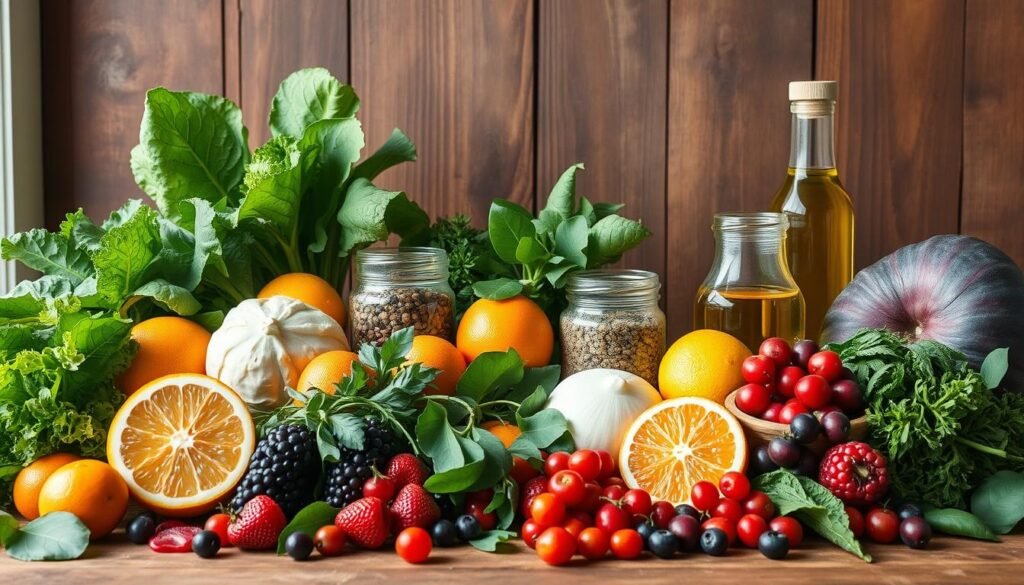Are you having trouble losing belly fat even with a good diet and exercise? New studies show that a bad liver can make it hard to lose weight.
Research is finding that some natural foods can clean and boost the liver. This helps burn fat and boosts health.
This article will dive into how liver health affects belly fat. We’ll also look at the best natural foods for a healthier you.
Key Takeaways
- Understand the link between liver function and stubborn belly fat
- Discover natural foods that promote liver detox and revitalization
- Learn how to incorporate these foods into your diet for optimal health
- Explore the benefits of a fat burn diet for overall well-being
- Find out how to maintain a healthy liver for long-term health
Understanding Liver Fat and Its Implications
Liver health is closely tied to fat buildup, known as fatty liver disease. The liver is key in metabolism, detox, and making digestive enzymes. Too much fat in liver cells can cause liver problems and serious health issues.
What is Fatty Liver Disease?
Fatty liver disease happens when liver cells hold too much fat, over 5% of the liver’s weight. It can be caused by obesity, too much alcohol, insulin resistance, and some medicines. It can cause liver inflammation and scarring, leading to cirrhosis or liver failure if not treated.
Types of Fatty Liver
There are two main types of fatty liver disease: Alcoholic Fatty Liver Disease (AFLD) and Non-Alcoholic Fatty Liver Disease (NAFLD). AFLD is linked to drinking too much alcohol. NAFLD happens in people who drink little or no alcohol.
| Type of Fatty Liver Disease | Causes | Characteristics |
|---|---|---|
| Alcoholic Fatty Liver Disease (AFLD) | Excessive alcohol consumption | Liver damage due to alcohol metabolism |
| Non-Alcoholic Fatty Liver Disease (NAFLD) | Obesity, insulin resistance, metabolic syndrome | Fat accumulation without significant alcohol consumption |
Knowing the type of fatty liver disease is key to finding the right treatment. For AFLD, stopping alcohol is needed. For NAFLD, changing diet and exercise habits is recommended.
The Role of Diet in Liver Health
The liver’s detox and revitalize work is greatly affected by what we eat. Eating foods rich in key nutrients helps the liver. But, a diet lacking these nutrients can harm the liver.
Eating right is key for a healthy liver. The liver helps with metabolism, detox, and making digestive chemicals. So, it’s important to eat the right foods to support these functions.
Key Nutrients for Liver Function
Some nutrients are great for liver health. These include:
- Antioxidants: They reduce liver stress and inflammation.
- Omega-3 Fatty Acids: They help lower inflammation and boost liver health.
- Fiber: It helps get rid of toxins and aids digestion.
- Vitamin E: It acts as an antioxidant, protecting liver cells.
A study in the Journal of Nutrition found that eating antioxidants and fiber improves liver health. It does this by reducing inflammation and helping with detox.
“A healthy liver is crucial for overall well-being, and diet plays a significant role in maintaining its health.”
| Nutrient | Benefit to Liver Health | Food Sources |
|---|---|---|
| Antioxidants | Reduce oxidative stress and inflammation | Berries, Leafy Greens, Nuts |
| Omega-3 Fatty Acids | Reduce inflammation | Fatty Fish, Flaxseeds, Walnuts |
| Fiber | Aid in toxin elimination and support digestion | Whole Grains, Fruits, Vegetables |
Foods to Avoid for a Healthy Liver
Some foods are good for the liver, while others are not. Foods high in sugar, salt, and unhealthy fats can harm the liver.
Here are some foods to limit or avoid:
- Sugary Drinks and Foods: They are high in fructose, which can cause fatty liver.
- Processed Foods: They often have unhealthy fats, salt, and preservatives.
- Alcohol: Too much can cause liver inflammation and damage.
Making smart food choices can greatly help liver health. Avoiding bad foods and eating nutrient-rich ones can keep the liver healthy.
Best Liver Detox Foods to Include
Eating the right foods can help your liver stay healthy. A diet full of certain nutrients boosts liver function. This improves your overall well-being.
Leafy Greens
Leafy greens like spinach, kale, and collard greens are full of antioxidants. They support liver health. Chlorophyll in these greens helps remove toxins from your blood.
Spinach is especially good because it has lots of glutathione. This antioxidant helps clean your liver.

Berries
Berries, like blueberries, strawberries, and raspberries, are full of antioxidants and fiber. They’re great for liver health. They also reduce inflammation and boost overall health.
Blueberries stand out because they have lots of antioxidants. These protect your liver from damage by free radicals.
Nuts and Seeds
Nuts and seeds, such as almonds, walnuts, and chia seeds, are rich in healthy fats and antioxidants. They help your liver function better and aid in detoxification.
- Almonds are a good source of vitamin E, which supports liver health.
- Chia seeds are rich in omega-3 fatty acids and fiber, promoting overall well-being.
Adding these foods to your diet can greatly support your liver’s health. It also boosts its natural detoxification processes.
The Impact of Hydration on Liver Function
Hydration is key for liver health and detox. The liver, vital for nutrient breakdown and toxin removal, needs enough water to work well.
Importance of Water Intake
Water helps the liver digest fats and absorb nutrients. It also helps remove toxins. Adequate water intake is crucial for liver efficiency.
Not drinking enough water can harm liver function. This can cause toxin buildup. Drinking at least eight glasses a day is advised. But, needs can change based on climate, activity, and health.
Herbal Teas for Detox
Some herbal teas also support liver detox. Herbal teas like peppermint, chamomile, and dandelion root tea are good for the liver.
- Peppermint tea aids in digestion and can help reduce nausea.
- Chamomile tea has anti-inflammatory properties that can soothe the liver.
- Dandelion root tea is believed to promote liver health by supporting its natural detoxification processes.
| Herbal Tea | Benefits for Liver Health |
|---|---|
| Peppermint Tea | Aids in digestion, reduces nausea |
| Chamomile Tea | Anti-inflammatory properties, soothes the liver |
| Dandelion Root Tea | Supports natural detoxification processes |
Adding these herbal teas to your routine can help your liver. But, always talk to a healthcare professional before changing your diet or hydration plan.
Meal Planning for a Fatty Liver Diet
Meal planning is key for liver health in people with fatty liver disease. A good meal plan can help manage the condition and boost overall health.
Sample Meal Plan Overview
A fatty liver diet meal plan should include many nutrient-rich foods. Here’s a daily meal plan example:
- Breakfast: Oatmeal with berries and nuts
- Lunch: Grilled chicken salad with leafy greens and avocado
- Dinner: Baked salmon with quinoa and steamed vegetables
- Snacks: Fresh fruits, carrot sticks with hummus
This meal plan gives you the nutrients you need. It also cuts down on bad fats and sugars.
Tips for Creating Healthy Meals
Creating healthy meals for a fatty liver diet involves several key strategies:
- Focus on whole foods: Choose whole, unprocessed foods like vegetables, fruits, whole grains, lean proteins, and healthy fats.
- Limit unhealthy fats: Cut down on saturated and trans fats in processed and fried foods.
- Stay hydrated: Drinking enough water is vital for liver function and health.
- Be mindful of portion sizes: Eating the right amount of food helps manage weight and reduces liver strain.
By following these tips, you can make a diet that supports liver health and overall well-being.
Lifestyle Changes to Support Liver Health
Making lifestyle changes is key to keeping your liver healthy. By adding healthy habits to your daily life, you can boost your liver’s function. This improves your overall health too.
Benefits of Regular Exercise
Regular exercise is vital for a healthy lifestyle that supports your liver. It helps keep your weight in check and improves how your body handles insulin. This lowers the risk of fatty liver disease. Exercise also boosts the liver’s detox process, helping it clear out toxins better.
Exercise also cuts down on inflammation and improves your metabolism. The many benefits of exercise for your liver make it a must for liver health support.

Reducing Alcohol Consumption
Drinking less alcohol is another important change for better liver health. Alcohol can lead to liver diseases like alcoholic hepatitis and cirrhosis. Drinking less can stop these diseases and help your liver work better.
| Lifestyle Change | Impact on Liver Health |
|---|---|
| Regular Exercise | Improves insulin sensitivity, reduces risk of fatty liver disease |
| Reducing Alcohol Consumption | Prevents liver disease, supports natural detoxification processes |
By making these lifestyle changes, you can actively support your liver health. Regular exercise and drinking less alcohol are easy ways to help your liver function better. They also improve your overall health.
The Science Behind Liver Fat Burn
The liver plays a key role in burning fat. It balances fat storage and breakdown. This is due to metabolic pathways and nutritional factors.
How the Liver Metabolizes Fat
The liver breaks down fats into fatty acids and glycerol. These are used for energy or stored for later. It uses beta-oxidation to break down fatty acids into acetyl-CoA. This is then used in the citric acid cycle to make energy.
The liver’s fat metabolism is influenced by nutrients and liver health. For example, omega-3 fatty acids support liver health and fat metabolism.
Factors Affecting Liver Fat Accumulation
Several factors can increase liver fat:
- Dietary habits: Eating too much saturated fat and sugar can increase liver fat.
- Lifestyle factors: Not enough exercise and too much alcohol can also increase liver fat.
- Genetic predisposition: Some people may naturally have more liver fat due to their genes.
- Metabolic health: Conditions like insulin resistance and metabolic syndrome can also impact liver fat levels.
Knowing these factors helps in managing liver fat. Making healthy diet choices and living a healthy lifestyle supports the liver’s fat-burning abilities.
Foods That Enhance Liver Fat Burn
The right foods can help your liver detoxify and burn fat better. Adding certain nutrients to your diet can boost liver health and function.
Avocados
Avocados are full of healthy fats and nutrients good for the liver. They have glutathione, a strong antioxidant that cleanses the liver.
Eating avocados can also help with weight management. This is key for reducing liver fat. The monounsaturated fats in avocados fight inflammation and support liver health.
Garlic
Garlic is great for your health, including your liver. It has compounds that activate liver enzymes, making the liver better at detoxifying and processing fats.
Garlic also fights inflammation, a big problem in fatty liver disease. Adding garlic to your meals is a simple way to help your liver.
Turmeric
Turmeric has curcumin, a compound with strong anti-inflammatory and antioxidant effects. Curcumin can reduce liver fat and inflammation, making it good for a liver-healthy diet.
The active compounds in turmeric also boost liver function. They help make more bile, which is key for fat digestion and absorption.
| Food | Nutrient | Benefit to Liver Health |
|---|---|---|
| Avocados | Glutathione, Monounsaturated Fats | Detoxification, Reduced Inflammation |
| Garlic | Compounds activating liver enzymes | Enhanced Detoxification, Reduced Inflammation |
| Turmeric | Curcumin | Reduced Liver Fat, Improved Liver Function |
Eating these foods can help your liver burn fat better. A balanced diet and a healthy lifestyle can greatly improve liver health.
Supplements That May Aid Liver Health
Some supplements can help support liver health, in addition to a good diet. These supplements have been studied for their benefits in liver function and overall health.
Milk Thistle
Milk thistle is known for its active compound, silymarin. Silymarin has antioxidant properties that protect the liver from toxins and free radicals. It may help liver cells regenerate and improve liver function in people with liver diseases.
Milk thistle may reduce inflammation and help liver cells grow back. But, talk to a healthcare professional before using it. It could interact with some medicines.
Omega-3 Fatty Acids
Omega-3 fatty acids, like EPA and DHA, are good for reducing inflammation. They are important for overall health. Research shows that omega-3 supplements can lower liver fat in people with NAFLD. They help the liver stay healthy by reducing inflammation and balancing fats.
Adding omega-3 fatty acids to your diet through supplements or fatty fish like salmon is good. But, the quality of omega-3 supplements varies. It’s important to choose a trusted brand and talk to a healthcare provider about the right dosage for you.
In summary, diet and lifestyle are key for liver health. But, supplements like milk thistle and omega-3 fatty acids can offer extra support. Always talk to a healthcare professional before starting any supplements to make sure they’re safe and right for you.
Potential Risks and Precautions
Keeping your liver healthy is key. The liver cleanses your body, breaks down food, and makes important chemicals. But, it can face dangers like fatty liver disease, hepatitis, and cirrhosis.
Liver health risks can be lessened by knowing what harms it. Drinking too much alcohol and eating lots of processed foods can hurt your liver. Also, some medicines and toxins can damage it.
Consulting Healthcare Professionals
It’s important to talk to doctors for advice on liver health. They can help with diet, lifestyle, and treatments for liver problems. A study in the Journal of Clinical Gastroenterology found that early action and lifestyle changes can greatly improve liver health.
“The importance of early diagnosis and treatment cannot be overstated, as it can prevent the progression of liver disease.”
Doctors can also suggest regular check-ups and tests to watch your liver. This can catch problems early, before they get worse.
Recognizing Symptoms of Liver Issues
Knowing the signs of liver problems is crucial. Look out for jaundice, tiredness, and belly pain. Severe liver disease can cause confusion, trouble focusing, and swelling in legs and ankles.
Spotting these symptoms early can lead to quick treatment. A liver health expert says, “Early detection is key to managing liver disease effectively.”
- Watch for jaundice and dark urine
- Report any ongoing tiredness or weakness
- See a doctor for belly pain or swelling
In summary, knowing the risks and taking steps to prevent them is essential for liver health. By talking to doctors and recognizing liver symptoms, you can help keep your liver healthy.
Conclusion: Embracing a Liver-Healthy Lifestyle
Choosing a liver-healthy lifestyle is a big step towards feeling better overall. Eating the right foods, drinking plenty of water, and making smart food choices can really help your liver. This can make a big difference in your health.
Benefits of a Healthy Liver
A healthy liver brings many benefits. It helps you burn energy better, gives you more energy, and lowers the chance of liver diseases. It also helps clean your body by removing harmful substances.
Implementing Dietary Changes
Changing what you eat is key to a liver-healthy lifestyle. Eat foods that are good for your liver, like leafy greens, berries, and nuts. Try to avoid foods that can harm your liver. Adding supplements like milk thistle and omega-3 fatty acids can also help.
By changing your diet and living a liver-healthy lifestyle, you can enjoy many benefits. This can lead to a better life overall.



